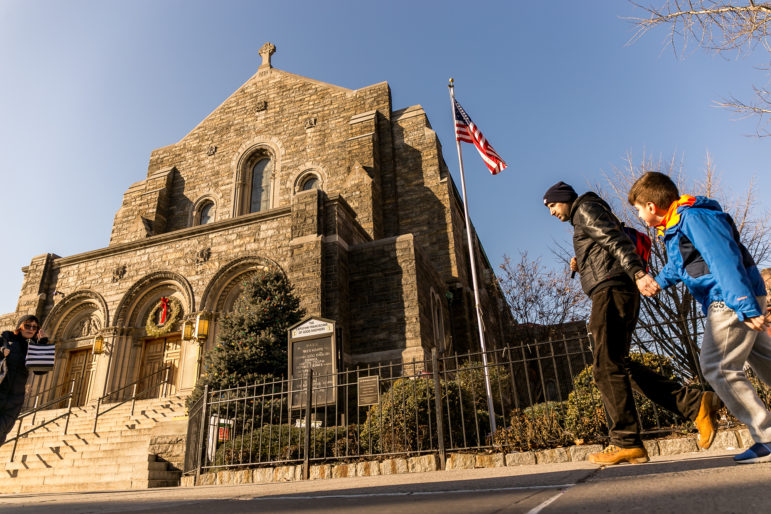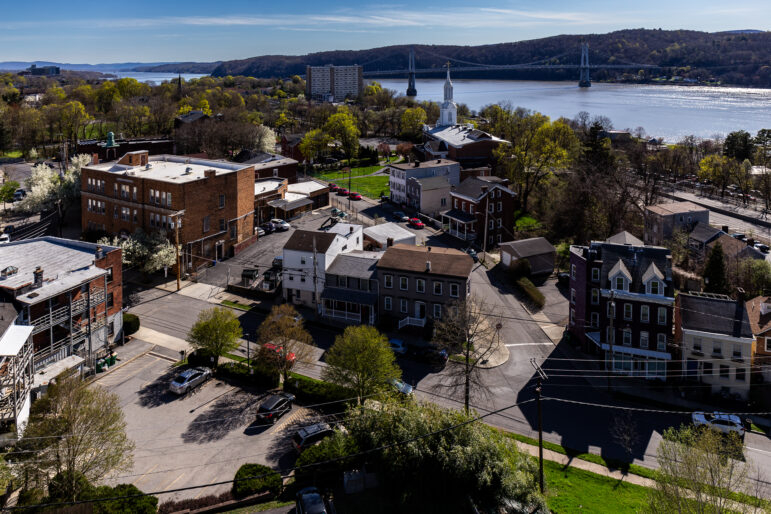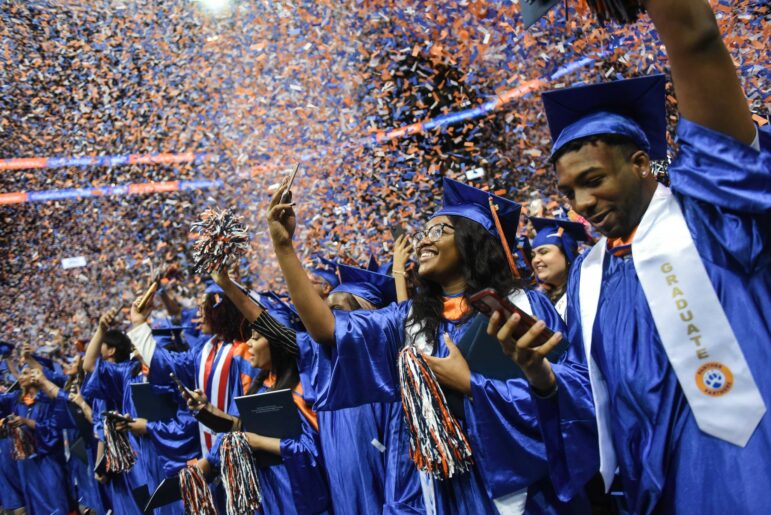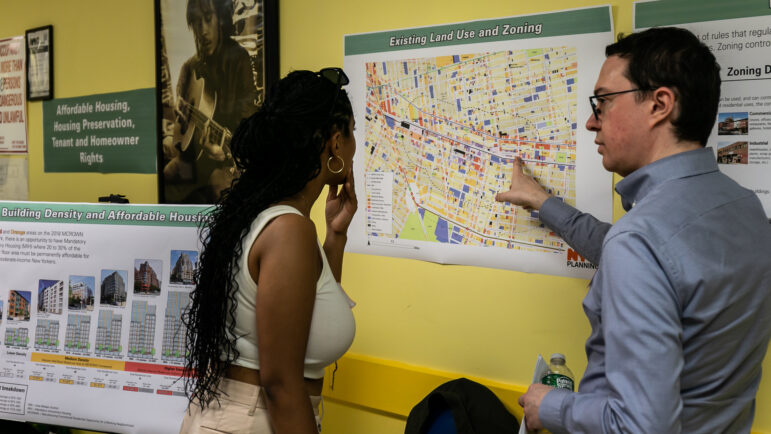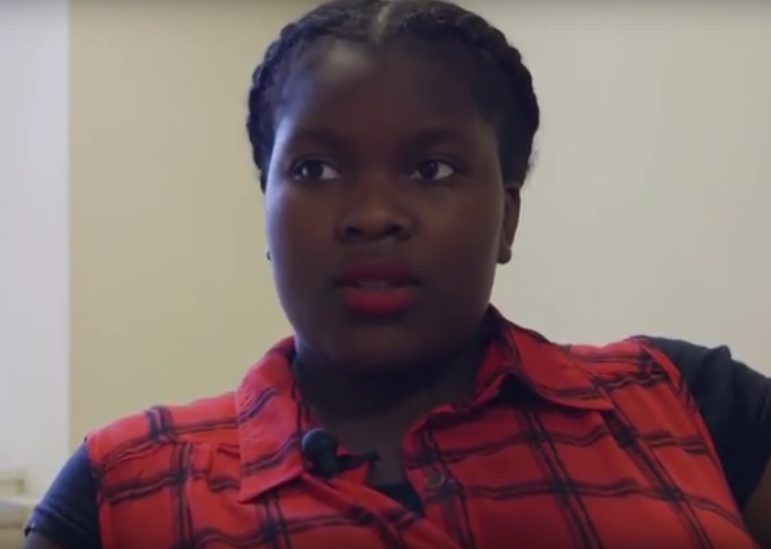
Erica Jackson
Bryanna Scott on campus at Brooklyn College.
Bryanna Scott, 18, is a student at Brooklyn College. Having attended elementary school at a public school before she transferred into a charter middle school called Achievement First Bushwick, she says the experience was drastically different.
“It wasn’t that bad. But there were so many more rules,” says Scott. “There was raising your hand to go to the bathroom or the uniform. I wasn’t used to uniforms. That was new for me.”
Her experience at Achievement First Brooklyn High School was filled with no shortage of schoolwork and limited free time. Scott is now a student at Brooklyn College and says it was that charter school experience that’s making college feel like a breeze. “I feel like they over-prepared us in a sense,” she added
While Scott says her charter school education has helped her in the transition to college, little is known about the broader impact of charter elementary and middle school education on a student’s college prospects. While the city’s Department of Education, says college enrollment data can be obtained by the elementary and middle school a student attended, charter schools say they track the data unevenly.
The debate about whether and why charter schools are uniquely valuable to students is over 10 years old, but it has focused on performance factors such as standardized tests, which students typically take in elementary and middle school. Largely unmeasured has been how charter students compare with people who attended regular schools when it comes to longer-term education goals, like getting into college, attending good colleges and completing a college degree.
A Texas study from 2016 is one of the small number of known studies to look into the subject. It looked at students who attended charter schools in Texas; and found that among students who attend charter schools with a “No Excuses,” approach—schools that according to the study have “higher behavioral expectations, stricter disciplinary codes, uniform requirements, and an extended school day and year”—enrollment in two and four-year colleges increased by 1.2 percentage points. The study also found that black and Hispanic students who attended “No Excuses” charter schools were significantly more likely to graduate from high school or enroll in a two or four-year college.
Promising signs
While some charter schools have started tracking students, others are relatively young so there is little or no data to show success based on college completion. In schools such as Success Academy High School of the Liberal Arts, which opened in 2014, the oldest students are in 11th grade.
While Achievement First tracks their students at Achievement First Brooklyn High School (Achievement First Director of Communications Amanda Pinto says the percentage of former students currently enrolled in college was 84 percent for the class of 2015 and 98 percent for the class of 2016) its other high school, Achievement First University Prep High School, opened its doors in August 2013, and will have its first graduating class this spring.
In schools with a longer lifespan, such as KIPP NYC, which keeps track of its students for college completion starting in eighth grade, the results look promising. According to the KIPP NYC Website, 89 percent of students matriculate into college. As of Spring 2016, 45 percent of KIPP Alumni completed a four-year degree compared to an average of 36 percent of students who graduated from New York City’s public high schools in 2006.
More than 85 percent of KIPP NYC students come from low-income families. National figures indicate that only 9 percent of students from low-income backgrounds completed a four-year degree.
Some of those students were probably college material before they entered a charter school. “I feel like I’ve always a naturally smart kid and I would have gone to a nice college or nice high school regardless,” says Damani Strasner, 18, who attended KIPP NYC College Prep high school after attending KIPP Star Middle School. But he does believe the high standards at KIPP helped him. Strasner recalled one of those moments in his high school, when his AP Global Teacher gave him an 80. “Before that class I never got below a 90 in that class ever in my entire life,” says Stasner.”I had to step my game up like I couldn’t just coast in history like I always did in my life. He really motivated me to do well and do better and I ended up having the highest grade in the class.”
Now a freshman at Vanderbilt studying human and organizational development, he adds:
“I feel like KIPP, they did a really job preparing us as writers because I was kind of scared coming in [to college]. I’ve only gotten lower than a B one time on an essay I’ve written.”
A fellow KIPP alum, Alicia Rodriguez, credits the school’s mindset. After she left public school for KIPP NYC Infinity School in seventh grade college was everywhere to be seen. Homerooms were organized according to the alma matter of homeroom teachers.
“I was in Northwestern and in seventh grade I was in Georgetown at some point and I remember I was in Howard,” says Rodriguez, who graduated from KIPP NYC College Prep. “There were just colleges everywhere. College banners everywhere. They talked to us about college. They took us to colleges in like almost every grade,” she added.”I felt like I was pushed to believe that I was going to go to college.” Now, a freshman at Bard College studying biology, Rodriguez says she’s doing well and is getting mostly A’s and one B.
Others point more to the specific instruction they received. Paige Banks, who attended the Democracy Prep charter school switched there during her freshman year of high school after attending Washington Irving, a public school in Manhattan.
“I wanted to be challenged more,” she says. Now a junior who majors in elementary education and minors in journalism at Knox College, Banks says writing was a major focus that paid off. “I came into college writing really strong papers and my professors would always tell me you’re a really strong writer and that’s not common for someone who’s just coming into college out of high school,” she says.
Gaps in the data
Given all the variables that affect an individual student’s success, anecdotes only tell us so much about the difference that charter schools do or don’t make. More comprehensive data is hard to come by.
For one thing, charter networks are uneven in how they track students depending on when each enters or leaves the network. At KIPP, college completion data is only tracked for students starting in eighth grade; and while Achievement First, tracks college admission and completion data for students who attended Achievement First Brooklyn High School, they don’t track the same data for students who only attended the elementary and middle schools and then left. Ralph Johnson, the Senior Director for College Success at Democracy Prep, also says that college data is only tracked for students who graduate from Democracy Prep High Schools.
New York City education organizations aren’t tracking the data either. The Research Alliance for New York City Public Schools, say they haven’t done analyses that look at high school graduation, college enrollment and college completion by elementary or middle school.
Families for Excellent Schools, a non-profit pro-charter organization, also says they don’t have access to data to map high school students outcomes based on the elementary and middle school a student attended.
Pedro Noguera, a professor of education at UCLA, says the question of charter schooling’s effects on college outcomes is one of the areas where more work needs to be done.
“We need to hold them accountable both [public and charter school’s] on long term outcomes but given that many charters make very bold claims about how they serve kids. I think there’s a scenario where more data is needed,” he says. “We would hope is that there is in fact a strong foundation— academic foundation for kids during the early years that it’s going to show up in the long term performance— high school, college, et cetera.”
Even a fuller dataset, however, won’t answer every question about charters—whose unique funding streams and demographics often differ from the public schools to which they’re compared. Education advocate Zakiyah Ansari says one of the issues that can impact long term performance for students at public schools in New York City is a lack of funding.
“When you don’t fund schools is it shuts down opportunities for children to be successful all around. It shuts down opportunities for us as parents to really engage in schools the way we need to,” says Ansari, the Advocacy Director with the Alliance for Quality Education, which opposes charters. “But it also shuts down— it denies dreams of our young people to go on to college if that’s what they choose to. It kind of halts that.”
Scott remains optimistic about her own dreams. But she does say her hyper-structured charter experience has left her having to deal with one challenge at college—having too much time on her hands. “You have all the time in the world and you have no idea to do with yourself,” she says.


